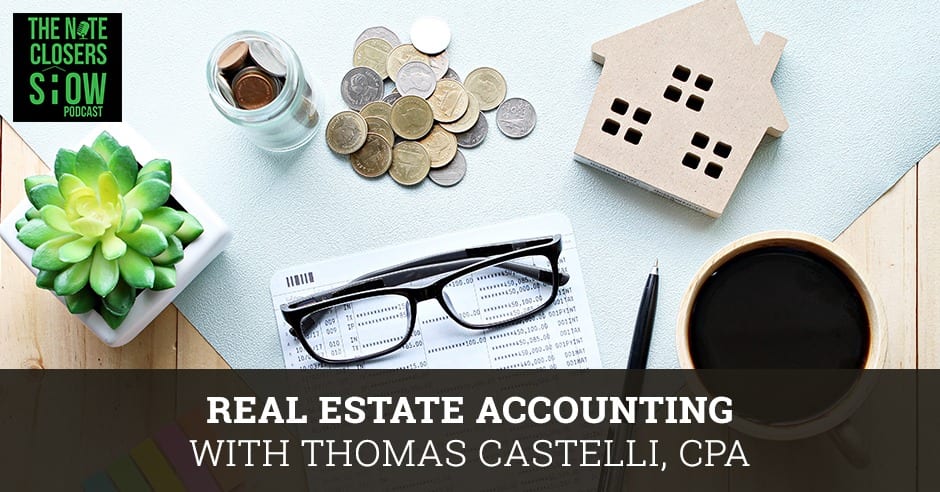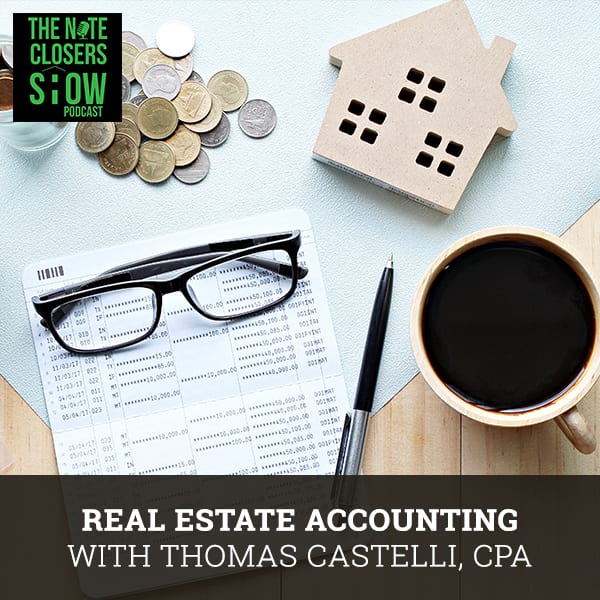
Starting out in the real estate business can be nerve-wracking, but with the right guidance, you can move forward with ease and be on your way to success. Real estate CPA, Thomas Castelli, talks about accounting in your real estate and note business along with some common mistakes that investors make when starting out. You can set your foundation as a new investor and you can veer away from typical slip-ups, but the biggest thing in every business is the accounting side. Thomas strongly recommends you document everything and stay organized. He also points out the importance of bringing an accountant or hiring somebody who is proactive to help you in your short-term and long-term cause.
—
Listen to the podcast here
Real Estate Accounting with Thomas Castelli, CPA
I am excited about our guest. Oftentimes, as I reach out to our audience, our Note Nation peeps out there and ask them, “Who would you like to see or what questions can we ask?” Part of the reason we do this show is to help educate you out there across the country on the different nuggets in the note business and real estate business. One of the overwhelming questions is, “Can you bring on a CPA to talk about accounting in real estate business?” I’m like, “Yes, let’s do that.” I think it’s quantum physics. I get an invite in my inbox, “Are you looking for somebody?” I’m like, “Yes, we are.” We are honored to have Thomas Castelli joining us from New York. Thomas is not only an accountant, but he’s also a very active real estate investor and his firm focuses solely on real estate investing. We’re going to dive into the content talking about some of the general things that real estate investors need to look forward then we’re going to do a little bit of a deeper dive, specifically on the note business. Welcome from New York, Thomas.
Thanks for having me on your show, Scott. I’m happy to be here. I’m excited.
Why don’t you take a second and share a little bit about your background, where you got to and where you’re at before we start diving in and doing some Q and A?
To make a long story short, I came out of college. While I was still in college I knew that the 9 to 5 grind is not where I wanted to be ultimately in the long term. I started reading a lot of books like The Richest Man in Babylon and Rich Dad Poor Dad. That rabbit hole took me pretty deeply. By the time I got out of college in between the period where I had started my first full-time job, I had attended some local REIA events. I found a group that did a seminar for multifamily syndication. That was back in around 2014 and I fell in love with that business model and that way of doing things. I started making some investments in a limited partner with someone who eventually becomes my mentor before doing a deal, 82 units in Jacksonville, Florida, as a general partner. I worked mostly on the acquisition side, identifying the property, getting it under contract, and doing the due diligence. We have that under management. That was exciting.
As that deal was going through, I came across The Real Estate CPA, which is the firm I work for. I got linked up with Brandon, the Founder and he was telling me all about his firm and what he does. He was like, “I will give you a two-week period if you want to work for me and see how it goes.” I got the two-week period and I ultimately came out the other side as a full-time employee. I’m a tax strategist. My role is helping real estate investors minimize their tax liability through various tax strategies. I’m planning and making sure they have a comprehensive understanding of their tax situation and what they need to do to minimize it. It’s an exciting role. I get to help people save money. I get to work with real estate investors who are my passion. When that all comes down, it’s exciting.
It’s fun working with a bunch of real estate jerks, isn’t it?
It’s always interesting. You’re always learning something new about real estate investing and operating a business. It’s always something different. That’s what keeps it good.
I always say every day is different but it’s all the same. It’s the creative mindset of people that I absolutely love. Finding ways to make things happen is always good, “Yes, we can make this happen. Let’s figure out a way,” versus saying no, which is what we see a lot in the workplace.
What we do is we go in and we take someone’s full picture of what they have been going on and we piece it together in such a way, and sometimes we get to change the picture too. We have to say, “Why don’t you start doing this?” or, “Why don’t you stop doing this so you can make this work?” That ultimately comes down to even though the tax laws and stuff like that are set in stone, there are ways that you can be creative with your facts and circumstances and what you’re doing on a day-to-day basis that could impact your tax situation. There’s definitely a creative side to this business for sure.
If you could wave a magic wand with a client that you have helped out and the real estate investors, if you could build your prototype real estate investor that would do the things that you told them to do when they need to do it and to build the premier or the perfect. What are some of the things that you would recommend to new investors out there to set the foundation so that later on they’re in a much better place?
The first thing to always say is you have to document everything and stay organized within your business. That’s the biggest thing, especially when it comes to the accounting side. Having clean books, having your numbers up to date and having them correct allows you to do a number of things. It allows you to make decisions on what you should do to grow your business or what you should stop doing that’s maybe holding your business back. For example, you might find in your portfolio that you have ten properties in Dayton, Ohio. They are doing well and you have another ten properties in Akron, Ohio that is underperforming. You might say, “Let me stop investing in Akron, Ohio and move my resources to Dayton where they’re better performing.” You can’t do that without knowing the numbers or the income and expenses for these properties. You can’t make any tax projections. You can’t make any tax decisions when you don’t have clean books. The first thing the ideal client would have to do is get their accounting system in place and in order. Make sure that they’re updating it, at minimum, on a monthly basis if not a weekly basis.
I’d say definitely on a monthly basis, a minimum at least. You don’t want to get beyond and forget what things are doing and what document as well. That’s the thing, setting up your book and talking with individuals to get things rock and rolling for you and putting those systems in place. It’s much easier to do it from the beginning than trying to wait a few months to go back and do things again.
It’s much easier. I’ve seen many people in situations that are far messed up. I’m like, “I wish you would have come to us earlier. We would have been able to untangle this web a little bit better.” I always say it’s like a shoe. If you tie the shoe correctly the first time and maintain that shoe and make sure you tie it, it’s not going to get knotted. If it gets all knotted up, it becomes a mess to clean up.

Real Estate Accounting: Documenting everything and getting things organized should be the initial thing to do in any business venture.
The analogy that comes to mind is Clark Griswold at Christmas light time if it’s nice and it’s all wrapped up, otherwise, it comes out and you’ve got a ball of light you’re trying to undo.
No one wants to deal with that. It takes more time and it’s frustrating. It’s better to get it done right the first time then maintain things right going forward.
How many investors or clients do you see have done that though? What are the percentages of those that have clean books versus those that procrastinate on doing this?
I would say probably 70% don’t do this and 30% do. It might even be a lower percentage that does that. I’m giving a conservative number based on what I’ve seen. There are some people who are super on top of it. There are some people in there who don’t care at all. There are some people in there who know they need to do this and understand they need to do it but don’t have the time or the know how to get it. Sometimes we can help people with that aspect of it but in general, more people don’t do it than people who do.
It affects them in the long run, let’s be honest about that.
It does because it becomes very hard, like my role as a tax strategist, to help you make a decision on how to reduce your tax liability if I don’t know what your income is for the year or what it is even currently at this point. It’s hard to make those determinations if a client comes to me and I’m like, “What’s your net income on this property?” and the client goes to me, “I don’t know.” It’s hard for me to make a recommendation of what you should do if you don’t know your income. If you come to me and say, “Property A’s net income is $1,700 for the year to date and B is this,” I can project out what your tax liability is going to be and then, therefore, help you reduce it. If we don’t know what those numbers are, we can never get a handle on what your tax liability is in the first place and make any recommendations at all.
You’ve got to see the big picture and be able to see where everything is coming from. One of the most important aspects of not only in real estate, but entrepreneurship is knowing where your money is coming and being able to focus on the Pareto Rule. If you’ve got 80% of your income coming from 20% of the type of assets, you should focus more on those 20% type of assets versus the others.
That’s having your books up to date, clean and correct. That’s what allows you to do to make those types of decisions.
Besides having their books clean, what’s the other thing that’s important to people that you would highly recommend? Do you have an IRA or having multiple LLCs? What are some other things?
The next thing is working with a CPA who’s going to put together a comprehensive tax plan for you and who’s going to be proactive. A lot of people out there go to their CPA. They go once a year in January or February and get their taxes done. The CPA will say, “Contribute a little bit more to your 401(k) or do this little test,” but it never really gives comprehensive advice. What I see a lot of clients do is we will review a client’s situation and we will look at it and we will say, “Why weren’t you doing this last year? Why weren’t you taking advantage of the 100% bonus depreciation? Why weren’t you taking advantage of the real estate professional status? Why weren’t you doing X, Y, Z?” They go, “My accountant never told me anything about that. My accountant never mentioned that. I had no idea that I could be doing that.”
We’d be getting your set up with a comprehensive tax plan where you’re understanding everything that’s available to you and what you should be prioritizing within that to minimize that tax liability. That’s another big thing. Other than that, it comes down to the individual situation of the client. Having an understanding of where you’re going as well. You have to understand what your goals are not only for 2019 or whatever year it is, but also the big picture so that you can set things up in the right way from the beginning as we alluded to before.
That’s the thing, you start with the end in mind. You may not be where you’re at now, where you want to be in several years, but at least have that idea. You said something very valuable. I want to make sure it’s a nugget that people understand is working with somebody who’s going to help you plan that out. Not be reactive and sign off on your taxes every year but having somebody who’s going to give you very valuable consult about what you’re doing or maybe doing incorrectly.
One thing that most rental property owners should not do is put their properties in an S corporation. It starts with the end in mind because, in order to get your properties out of S corporation, you need to sell the property. You can’t just transfer it out as you go with the partnership or single member LLC. That becomes important when it comes to estate planning. If you know that your goal is to leave a legacy or whatever the case is when you pass on, it’s going to be a lot easier to structure your business in a way to make that estate planning process easier to transition when that time comes. Whereas if you don’t know what you’re doing or you don’t know what you ultimately want, someone could give you advice that might be very sound advice but ultimately has a detrimental effect on your tax or financial situation down the line. Whereas if you would have had known that’s where you were headed in the beginning, that advice might have been different.

Real Estate Accounting: Start with the end in mind.
That totally makes a lot of sense because things and priorities change as we get older, health, family, state planning, things like that. That’s a good bit of advice there. You said having a real estate professional status. Do you see a lot of people goofing up and not using that? What are some of the advantages of having that status?
The real estate professional status ultimately allows you to take passive losses against your ordinary income. Most rental real estate, specifically, the rental income or loss from that is considered passive because that is put in its own little bucket. Passive losses can only offset passive income but passive income can be offset by any type of income. The bottom line is usually when you have rental real estate, you have all these losses that are created by depreciation. These days with the Tax Cuts and JOBS Act, you can use 100% bonus depreciation and cost segregation studies to increase that loss amount. Unless you’re a real estate professional, those losses are going to be suspended and carried forward to your passive income. In other words, rental income or you sell a property within your portfolio and you generate a capital gain, then those losses are going to off. Those losses will be unlocked.
The real estate professional take those losses and use them against your ordinary income now. If you’re a full-time real estate investor or for instance, your spouse doesn’t work or works part-time, there’s a chance where you could qualify as a real estate professional and do damage in a positive way to your taxable income by reducing it with those losses. It’s powerful and sometimes when I’ve seen full-time investors that could easily qualify for this and not taking advantage of it, it’s from lack of advice. That’s the real estate professional status. Do you want me to go into the requirements to get there?
That’s a valuable nugget for people out there and saving on taxes for sure. Let’s talk about that. You’re doing a great job.
There are two different parts of the real estate professional status. The first part, which is the 750-hour requirements. You have to work 750 or more hours in a real estate trader business and more than half of your total working time. If you had a part-time job, let’s say you’re a consultant and you work 1,000 hours being a consultant, you have to work 1,001 hours to get that first requirement. That qualifies you as a real estate professional. The businesses you can work in to get there are pretty vast. You can work in as an agent. You could work as a property manager. You can work as an investor. The key there is you have to own 5% of your employer if you are employed. It accounts for those hours to qualify for a real estate professional. Getting to those hourly requirements is not enough. Before we get to that, let me back up and add in there that if your spouse can qualify as a real estate professional, then you both qualify. Married couples are considered as professionals if you meet that first test.
Next is the material participation test. That test says that you are materially participating in your rental portfolio. That’s usually with rental activities. Things like screening tenants, signing new leases, advertising for rent, and your general rental activities. That’s what usually gets you there. As a real estate professional, you’re going to have probably multiple properties. In order to not have to meet that test on each property, you ultimately group these properties together as one. There are seven different tests to get material participation. The most common one is the 500-hour tests. It means you’re spending 500 hours across your rental portfolio because you’re grouping multiple properties together across your portfolio. That’s what allows you to take your losses. If you don’t meet the material participation tests, you can’t use your losses from that activity against your other income from your W2 job, your spouse’s W2 job or another active business you might have where you’re self-employed, like being a consultant, a doctor or something along those lines.
Five hundred hours, that’s an average of ten hours a week for 50 weeks out of the year if you’re doing that on a portfolio of ten assets, that’s what you’re saying. Those ten assets should all be titled the same. It’s in the same LLC. You’d be the owner of that LLC but at least 5% or more based on some of the numbers you’ve mentioned.
That part of it, you need to own at least 5% of the entity to take these hours. The structure of it isn’t necessarily as important because you could group all your rental activities together. I could be a 10% owner in a partnership. I can group that together with a property that I own 100%. That part is a little bit more in general. It’s not that important. On a case-by-case basis, there might be some issues to look into for some clients. In general, it’s that you have that ownership percentage and that you’re materially participating in it.
Would you classify mortgage investors that are buying distressed debt in that real estate professional or would you classify them somewhere else?
It’s a gray area for sure. In certain circumstances, you may be able to qualify for it, but most of the time you’re considered to be in the business of finance. The real definition is real property, trade or business. That’s usually things like property management, brokering the real estate.
We took back a lot of REOs and we had a rental portfolio from foreclosures that we took back to help constitute that.
If you’re actually acquiring the property, whether it be through foreclosure otherwise, that’s when you’re in the real property trade business. Until then, you’re in the finance business. For the most part, it won’t qualify. With that said, you could be a real estate professional and being in the finance business at the same time, which should be lucrative if you’re a note investor.
Those are some great things. Start with the end in mind and make sure you hire somebody who’s going to be proactive for you. What are some of the biggest things that you see that drives you crazy when you’re talking to clients?

Real Estate Accounting: You could be a real estate professional and be in the finance business at the same time.
Early liquidations. This gets into the retirement account philosophy and investing. At the end of the day, retirement accounts should be for that. When you have a retirement account, you should be using it as a retirement account vehicle. That’s what it has been meant for. You can self-direct these accounts and invest in any number of things without direct property. You can invest in notes, note funds, hard money, private money through the retirement account and with self-directed IRA specifically when you’re doing that. That’s the ideal investment not only for the retirement account but that’s one of the ideal vehicles to operate the type of business because you’re completely sheltering the interest income from tax within the account. There’s no UBIT, for everybody who is familiar with UBIT, on the active investments that are leveraged with debt. That’s the ideal vehicle.
Some people want to say, “I’m going to go pull my money out of the retirement account.” Paint this picture, it doesn’t matter what your tax record is, you’re getting hit with 10% penalty. You’re getting hit with federal taxes, which could be anywhere from 0% to 37% and state taxes if you’re in a state that charges a state tax. I’ve seen clients easily pay 35% to 50% of their balance in taxes. That’s greatly diminishing the principal you have to invest. Whereas even if you are going to invest in direct real estate and you are going to get hit with that UBIT tax, from my experience, UBIT is going to diminish your returns anywhere between 1% to 2% on direct real estate. That’s on your return. That’s not on your principal. You’re taking your investment principal and hitting it. It doesn’t make sense from an investment perspective. That’s probably one of my biggest pet peeves is when I see people doing that.
We’re talking about they’re pulling it out permanently. They’re not pulling it out temporarily and putting it back in and taking a loan against their 401(k) or using a quick withdrawal and then putting it back. Within 60 days, you have the right to put it back with the penalty in taxes.
For IRAs, you have 60 days. It might be similar for 401(k)s. For 401(k)s, you can take a loan. You could take up to 50% of your balance up to $50,000. You could take a loan out a 401(k). You can’t do that with an IRA. I’m talking about liquidating the IRA and getting hit with these penalties to go and do investing in real estate in whatever form. You’re playing to invest. There are better ways to go about it. I’d hate to see that.
That’s the thing if it’s a retirement account, don’t be using it to finance. Use that if you’re using the self-direct and do a transfer in kind. I’ve seen this, “I’m liquidating.” I’m like, “Why are you liquidating? Do a transfer in kind. It’s an easy thing. There are no penalties to do that. You still use it.” One of the things that I always tell people is that no matter how much money you have in your retirement accounts, you’ve got to learn how to market it. At some point, you’re probably going to be using other people’s money to drive deals and take down bigger things. That’s good stuff. Is that the only pet peeve you have? What’s the biggest thing for the most part?
That’s the biggest thing I have. Another pet peeve is when you give someone advice, you give them the roadmap and then they do a number of things. Either they don’t act on it. In order to do anything in life, if you’re going to get advice, whether it be from a coach on how to do investing, whether you’re going to get tax advice, there’s going to be something you’re going to have to do to implement that for the most part. You might have to change some facts and circumstances as people don’t like to hear that. Sometimes people just wanted to do everything they’re doing now. If you keep doing the same thing, you’re going to get the same results. That’s another pet peeve.
Another thing too is when someone comes to you as an advisor and they say, “I’ve got about that on the internet. I don’t need you.” When you’re coming to an advisor or you’re coming to a coach, you’re coming from guidance on your personal situation to understand and to make sure that what you’re doing is right. You’re coming from someone who’s done it before, from a professional who understands what they’re doing for your piece of mind. If you’re a do it yourself person and you can go and read everything you want on the internet and if you want to piece it together yourself, you can. If you’re going to be working with a coach or an advisor stand that you’re coming to them for guidance and peace of mind. You’re not coming to them necessarily for them to tell you something you can read online. That’s another pet peeve.
I’m glad you say that because a lot of times people seek advice and they’re getting advice from everybody. When it comes to speaking with an accountant or an attorney, they’re getting counsel. They’re dealing with people that don’t want them to fail. You don’t want somebody to fail when you give them counsel and give them a roadmap. That’s the most frustrating thing is when you give somebody a roadmap to success and they choose to take the exit ramp before the first road. They want to argue with you. I’m like, “Why are you wasting my time?” You can sit here and argue with me. It’s not easy. People have to make changes in their daily, weekly, monthly habits to get somewhat different. If you’re doing the same thing and expect different results, you’re the crazy person, not the person who gave you advice. You are dealing with investors all across the country, not just up in New York.
We’re dealing with investors nationwide. We have clients in 37 states. We have a lot of clients in California and Texas. We have a handful in New York. We have a lot in Virginia for some reason. We’re across the nation, all 50 states.
With the updates of the Tax Code, what are some things that people are missing out there that they should be taking advantage of?
With the new Tax Code, the 100% bonus depreciation is probably the biggest thing in there for real estate investors. It allows you to depreciate your five, seven and fifteen-year property. All in the first year, you place that property in service when you combine that with a cost segregation study. I will give you a quick example. Let’s say I buy a property for $1 million. Generally, cost segregation could save you anywhere between 20% and 30% of the purchase price. It depends on location and any number of factors but let’s say 25%. You’re able to take a depreciation deduction of $250,000 that year. Think about that if you’re a real estate professional. Let’s say your spouse is a doctor who is earning $1 million per year. That’s $250,000, that’s going to reduce your taxable income right there to $750,000 right off the bat. If you had to set 37% tax bracket, that’s saving you $92,000.
100% bonus depreciation from 2018 to 2023 and then it starts to go down. For these first few years, you’re going to be able to take massive write-offs against your income. If you’re a real estate professional, that’s great. Even if you’re not, these losses will be suspended and ultimately be used when you sell your property and will be in lock. That’s probably the biggest nugget in there. The other one is there are Opportunity Zones and funds. There are some exciting things you can do in there. The momentum is not picking up quite as much as you would expect. That’s largely because of the lack of final guidance by the IRS and treasury in how to do this. It is caused primarily by the rush bill in addition to the government shutdown that took place earlier this year. Those are the two biggest things out of the Tax Cuts and JOBS Act for the real estate investors.
That’s huge money. That’s huge savings that you will be able to write-off. If you don’t know about it, you’re throwing money away.

Real Estate Accounting: The most frustrating thing is when you give somebody a roadmap to success and they choose to take the exit ramp before the first road.
With real estate, you can’t get your tax liability close to zero. You can do that largely with 100% bonus depreciation.
Let’s talk a little bit about the people that you are working with. What kind of an ideal client, somebody that your run of the mill client that you start off working with and build up?
Our ideal client has just got started in real estate. We can help them set everything up going forward. We’ll get them into a good position on the accounting side and make sure they’re setting up their accounting systems right starting from the beginning, as well as the tax strategy side. We’re making sure they have a tax plan and that they have their entity structuring right from the beginning because that can easily get complicated. Our ideal client might be someone who is already in the thick of it, who’s already there, who already has ten properties. We need to help them readjust and get everything to reset up and help them get things moving from where they are.
I wouldn’t say that our ideal clients may be based on size. Maybe it’s based on the direction where you’re going. We can help active clients or people who are active in the business a lot more than we can help people who are passive investors. If you’re going to be investing in syndications, you’re going to be investing as a passive investor. There are ways we could help but it’s not as great. If you’re actively getting involved whether you’re getting started or you’re already in the middle of things, that’s our ideal client. It’s active real estate investors who are building a portfolio.
That’s a great point there because as real estate entrepreneurs, we’re a lot of control freaks. At a point, we’re like, “We will do it ourselves. Why pay somebody to do my books when I can hire a part-time bookkeeper to come and do it?” When you said that number like ten, that’s one thing we’ve seen in the note business too. With documents and things coming in and all the moving parts that go along with it, you start getting into that double-digit assets stuff. There’s no way you can keep track of it all yourself. That’s why you’ve got to bring on an accountant like you to help long-term. There are not enough hours in the day, especially if this is a side hustle for you or even a full-time job, to keep up with everything, to be a tax expert, a rehab expert, a note expert and an entrepreneur at the same time.
We see this all the time and I’m the same way. I’m that person. I will do everything myself. You have to realize that when you’re getting into the real estate game, you’re building a business at the end of the day. When you have a business, you have different aspects of that business that may need to be here too, especially as you’re scaling. You have to realize what’s the highest and best use of your time is. People always talk about this. As an investor, your highest best use of your time is finding deals and finding investors. If you’re on the note side, it’s identifying who to lend to, who not to lend to, and securing those notes and whatnot. Securing the financing and maybe using HELOCs for those notes.
It’s not doing the accounting. It’s not trying to be the tax strategists yourself and pair and piecing everything together. It’s not doing the administrative work. It’s not setting out all your emails. It’s not replying to every email. It’s not answering every phone call maybe. These are things you need to outsource to people or insource into your company at some point, perhaps as you scale larger so that you can focus on the core tasks that are going to grow your business. It’s a mindset shift going from the employee mindset where you do everything to go into the business side where you’re learning to let go and say, “I’m hiring a competent CPA firm. I’m hiring a competent law firm. I’m going to put those tasks in their court and trust them to get the job done based on what my goals or what my company’s doing.”
We’re speaking the same language because that’s one of the big things we see. We had a lot of people come into the real estate space to start off, working a full-time W2 job, and they move in the note space. They get so used trying to do it themselves. They will do it for a few months and I’m sitting here like, “You need to hire somebody. Hire a VA, hire an assistant to do a lot of that little stuff that’s below your pay grade as an entrepreneur.” That way you are focused on higher-dollar revenue-generating or the most productive aspects of your time. There are a lot of great ways to bring somebody on either a part-time assistant, a VA or something like that and be able to write that cost off for having an employee.
Employee expenses, whether they’re 1099, a contractor working for you or you have them as a W2 employee. 1099, for the most part, is optimal from an expense standpoint. You could write those off as it’s a way to expense. That’s an expense on your P&L. It’s deducted from your gross income, it reduces your net income, and frees up your time.
Let’s talk about you as an active investor. What’s your bread and butter besides people that are catching up their retirement accounts? You mentioned the 92-unit complex in Jacksonville. What are some of the things that you love doing?
I did 82 units, but the way that happened was I liked the syndication model. I liked the model of being able to go in there and outsourcing something to somebody else, third-party property management to do what they do best, tenant the building, oversee the renovations, do the day-to-day accounting, all that stuff. That’s what we did. It’s under management. We’re finishing up the value-add and we’re going to sell it. I took this role on as tax strategists. I took a step back from more of the active side of the real estate. Because of where we are in the game of syndication in the multifamily position, I’d be competing at this point with people that already have businesses set up, relationships built, and all of this.
I see where we are at the cycle as, “It’s better to focus on this.” I did make a few passive investments since becoming it. I sit back and make those investment people already have those business set up. When the time presents itself when the market’s a little bit less competitive which I’m sure it’s going to happen sooner or later and then jump back into the active side. I’m sitting tight watching everything go by. I’m making investments with people who I could trust to be able to operate those properties during a recession or something like that. That’s where I’m at. We had this property that we have under management and making sure that goes right so we can sell it. When we exit that deal, I will probably maybe look at going active again for another one. It depends on where we are ultimately when that happens.
That makes perfect sense. Where do you see the market going? I take it you’re expecting to see a downturn in the near future based on what you said.

Real Estate Accounting: Always invest with people whom you can trust to be able to operate your properties during a recession.
A lot of the people we interviewed on our podcast say that they think we’re closer to the top. I think we’re closer to the top based on the run. People will say, “You can’t expect the downturn because we’re ‘due for one.’” I don’t necessarily agree with that. I’m saying, we’re on such a long run. At some point, we’re at the longest bull run in history. We have a lot of cheap money going on. The multifamily market specifically is very competitive. Other real estate markets, other asset classes are also seeing an increase in competition. At some point, it’s going to drop. When that does happen, if you have a good cash position or you have investors who have a good cash position, you can go clean house and buy large properties.
Sam Zell, a big real estate investor, he’s been liquidating parts of his portfolio since 2015. One of his quotes in an article not too long ago was something along the lines that the people in the near future are going to have an opportunity to buy properties at a steep discount. That’s the way I’m looking at it. A lot of coaches will say, “Go out there and find properties.” You absolutely can. It’s just is that the highest and best use of your time at this point to go compete with people who already have businesses that are set up, businesses that are already healthy, relationships that are already established? Should you maybe do something else building up your cash reserve? When the market turns in your favor and it becomes a buyer’s market. It’s definitely a seller’s market. That’s when you dive in and you start picking up properties and then you ride the next wave.
I couldn’t agree with you more in that because I think we are due for a downturn. Many years ago, it was a buyer’s market. Everything was on sale no matter what it was. It’s been nice, we’ve seen it rebound and come back. We still see 3.5% default rate across the country. One out of ten Americans is a month behind in their mortgage now. Those are signs that people are getting strapped for cash because they can’t afford the places they live in. You live in an expensive place. We’ve got friends in San Francisco. They can’t afford to live there even with their jobs and vice versa. What are some of the things that you would recommend that people should be doing to their books and their accounting, besides saving money or putting money away for that day when the rain starts coming? Should they start planning with their books and with their accounting to help out with that?
I used to take it back before, making sure that they’re all clean. You start doing performance metrics. You can start saying, “These properties are performing.” You start looking at the market that you’re investing in and saying, “Where is that market in this point cycle? Is that market getting a little overheated? Are the prices starting to get a little bit ridiculous in that market compared to the fundamentals?” If that’s the case, maybe you should consider selling off some of those assets, converting that into cash, and having that for the next downturn. That you can get by having those good records and setting up a dashboard perhaps where maybe you’re taking the P&Ls. It depends on the accounting system you’re using.
You could usually download P&Ls in Excel and you could manipulate those P&Ls to give you those metrics. You can start comparing it to the market that you’re investing in and the market overall and making that decision. For instance, the property, the eight units, the one that we have under management. We’re getting ridiculous offers for that property. We know they’re ridiculous offers. Now we’re paying attention to the market. We also know what our numbers are. Our property manager, in this specific case, keeps very good records for us. We know based on our NOI that this property is starting to get a little overheated. The market is starting a little overheated for what this property may actually be worth. We may be interested in selling it because we think that that’s where we are.
Why wait two years to regentrify an asset if someone’s willing to offer you a price now for what you think you’d get two years from now and not knowing what’s going to happen in two years. Multifamily, especially in the larger 20 to 50 plus, you start getting bigger complexes. I think the pricing is way overpriced. We see a lot of stuff that’s the smaller units where you don’t have a full-time property manager, twenty units or less you’ve got in a local area. Those aren’t bad. Those are still priced accordingly because the banks don’t want to deal with them. They want to deal with higher value assets for the most part. It’s a crazy time out there. We’ve been cashing out some position. We’ve been cashing out some of our notes, look out stuff from reperforming stuff off and go from there. One of the things that happen with us in the note business here is when we buy a nonperforming note, let’s say the unpaid balance is $100,000 and we picked it up for $30,000. If we reach out to the borrowers and we’re able to either modify or get that loan reinstated, the IRS wants to tax that transaction at the full $100,000. We only paid $30,000. We only received $20,000 in income in the process. We’ve worked to do that. What are some ways that you would recommend for people to help offset that sticker shock with the IRS?
You’re saying the debt forgiveness. The best thing you could do there if you’re a full-time real estate investor and you could qualify as a real estate professional would be to buy properties, use 100% bonus depreciation to offset that game. Other than that, it’s difficult to do that. The only other way you can maybe do that is if you’re doing a set of retirement account where there is no tax liability. It makes the retirement accounts such a lucrative vehicle for note investor because you can do whatever you need to do within that account. For the most part, you’re not going to have to pay any tax bills. Other than that, it is the real estate professional and cost segregation, combo with 100% bonus depreciation. That would be the ideal strategy there.
There are some other ways you could do that. You can invest in Shell Oil. It will help you get there with some things. You could do a conservation easement which is something that’s a little controversial because there are some things going on. Briefly, land conservation easements allow you to invest in a syndicate essentially where they will put a conservation easement on it, which means no one could ever develop that land again. You get a charitable deduction for that easement. It’s usually four to five times higher than the investment amount you’re getting. That’s one way to do it. It’s an ordinary income. It’s very difficult to shelter because without being a real estate professional, without using these strategies, the only way you do it is through having ordinary losses from a normal business. Generally, to have ordinary losses from normal business, for the most part, you’re going to have losses. It becomes difficult, but those are the strategies.
One of the things I know that we’ve done in the past as well too, I love all those things. A third-party gives us a valuation of the assets. I’ve had to do that for IRA accounts. I’ve had to do that for investors who’ve come to me being an expert in the industry, “Could you give us a true valuation of this asset?” That helps them offset the value of the asset too and providing that with their tax returns. The value isn’t $100,000. It’s maybe $35,000 because they’ve gotten $5,000 in and worked their way to that. Have you had people use that before or heard of that?
We’ve had people get valuations and stuff and appraisals to discount the price of the property or the book value of the property to say, “This asset isn’t worth what it was anymore.” It is only worth $35,000 where you’re paying a small amount of tax. You’re actually taking a loss on it. That is another strategy for sure.
What would you say is the biggest opportunity in the real estate area for people to come in? I know you’ve laid out some things, the cost segregation, the different write-offs, and things like that. What would you say is the biggest opportunity that you see out there? I know there’s been some talk about the opportunity funds. Are you seeing some of that taking place?
That’s a great opportunity. Opportunity Zones are low-income communities across the nation, 8,700 of them. Some of them are more gentrified areas. What they do is they allow you to go in there and you can buy buildings and renovate them. You can easily raise money for them because of the tax benefits of the opportunity fund. From an active investor standpoint, that’s a huge opportunity for you to come in there, buy assets at a lower price and be able to do substantial value-adds to them. It substantially raises the price and then you will sell them and at the same time, allowing your investors to get some tax benefits. At the same time, if you’re liquidating some of your assets, you can roll the capital gains portion of the sale into the fund.
You could roll the entire portion if you want, but only the capital gains portion would get the tax benefits, which are the benefits of being able to defer your taxes and also reduce them up to 15%. For instance, you had $100,000 capital gain. If you held the investment in the opportunity fund for seven years, you could reduce it down to $85,000 of the capital gain that can be taxed on. As you see, that number gets bigger, that could scale good for you. If you hold the investment for ten years in the opportunity fund, and it doesn’t have to be in the same asset for the entire ten years either, but you hold the investment in the opportunity fund itself for ten years. You get the entire capital gain from that investment exempt.

Real Estate Accounting: Land conservation easements allow you to invest in a syndicate essentially where they will put a conservation easement on it.
Let’s say that $100,000 in ten years is now $270,000. $170,000 in ten years that you would have had to pay capital gains tax on is now completely exempt from tax. That’s a huge opportunity on both sides of the equation, whether you’re liquidating the property or you’re liquidating assets, any capital, it could be stocks, bonds, mutual funds, real estate, notes, all that stuff. You could be an active investor and take advantage of the opportunity to buy properties at a steep discount within these markets, renovate them, and make a killing on that side. That’s the big opportunity now if you would do something like that.
That’s mind-boggling. Thomas, is there a best way for people to reach out to you to spend some more time with you? Is there a website or stuff like that to learn more about what you are doing?
If you want to learn more about us and what we do, TheRealEstateCPA.com would be the best resource to browse through what we have going on. We do have a podcast ourselves, The Real Estate CPA Podcast, where we talk about things from a tax and accounting perspective. If you want to learn more about tax strategies, if you want to hear interviews from other investors on what they do and how they handle accounting taxes, what tax strategies they use for their circumstances. You definitely want to check that out. Other than that, you can contact me by email at Thomas.Castelli@HallCPALLC.com.
Thomas, you have been a wealth of information. I’d love to have you back on a later date if that works right for you.
I would love to come back on and we’d love to have you on our podcast as well if you’re open to it.
I would totally be open for it. Once again everybody at Note Nation, you heard some great nuggets here. What you choose to do with those nuggets that Thomas has provided is totally up to you. As he likes to say, “If you’ve got some counsel, go do some things with it.” Put your books in place. Don’t be like one of the 70, 75 or 80 percenters out there who aren’t doing their books properly. They’re not taking the time to do that. I know a lot of you out there fall in that category. I was once in that category as well. I understand that aspect of it. The thing is everything is correctable if you start taking action to make things happen.
You’ve got to start taking action. All the knowledge in the world won’t mean anything for you unless you start implementing it into your life. You’ve got to take action.
TheRealEstateCPA.com, go to the podcast as well. Go check it out and listen to them. They’ve got great interviews on it. I’ve been bingeing to it and loving it and that’s why we’ve got Thomas on here. Thomas, thanks for taking the time out of your busy day to be with us. We appreciate it and we look forward to hearing from you in the future as well.
Thank you for having me on. It was an honor to be here.
Reach out to Thomas. Like he said, “It’s never too early to start putting a plan of success together.” Go out and make it happen. We will see you at the top.
Important Links:
- Thomas Castelli
- The Richest Man in Babylon
- Rich Dad Poor Dad
- The Real Estate CPA Podcast
- Thomas.Castelli@HallCPALLC.com
- www.TheRealEstateCPA.com
About Thomas Castelli
 Thomas Castelli is a Tax Strategist and real estate investor who helps other real estate investors keep more of their hard-earned dollars in their pockets, and out of the government’s.
Thomas Castelli is a Tax Strategist and real estate investor who helps other real estate investors keep more of their hard-earned dollars in their pockets, and out of the government’s.

